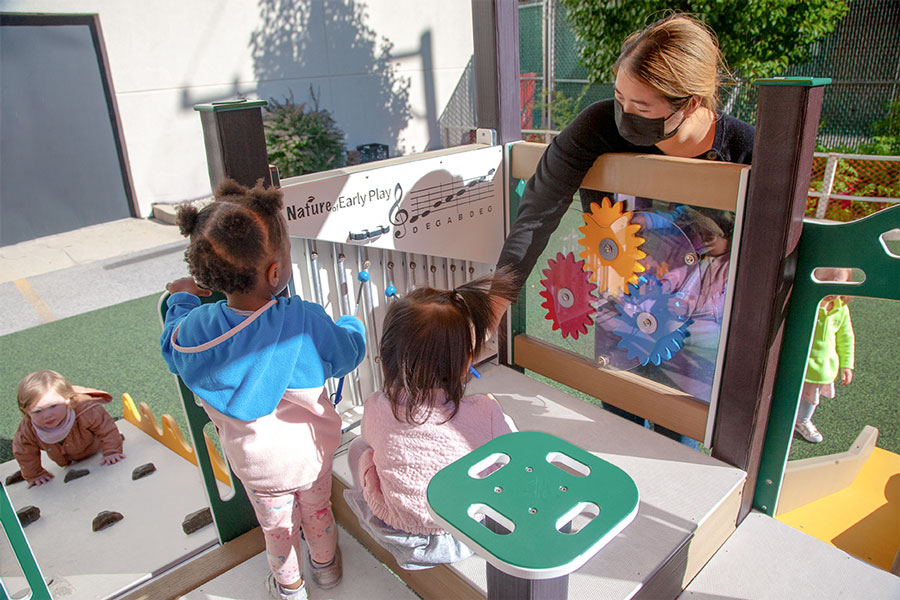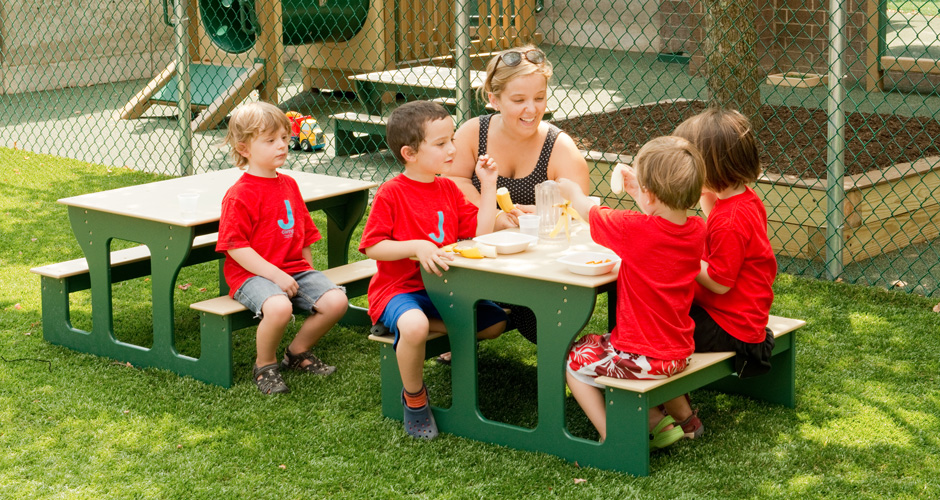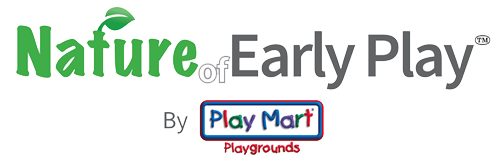How Nature of Early Play Enhances Montessori Early Childhood Education
"Truly it is nature which affords the child the opportunity to grow; it is nature which bestows independence upon him and guides him to success in achieving his freedom." - Maria Montessori
 Play is more than just fun and games for children—it's a key component of their growth and education, especially in Montessori schools and early childhood programs. The Montessori philosophy emphasizes hands-on, experiential learning, which naturally aligns with the value of play in fostering a child's development. When this learning occurs outdoors in thoughtfully designed playgrounds, the benefits multiply.
Play is more than just fun and games for children—it's a key component of their growth and education, especially in Montessori schools and early childhood programs. The Montessori philosophy emphasizes hands-on, experiential learning, which naturally aligns with the value of play in fostering a child's development. When this learning occurs outdoors in thoughtfully designed playgrounds, the benefits multiply.
Nature of Early Play creates innovative playground equipment that promotes active, exploratory play and integrates seamlessly into the Montessori way of teaching. From STEM playsets to eco-conscious materials, Nature of Early Play helps Montessori educators provide young children a well-rounded, engaging learning environment.
If you're a Montessori educator or early childhood development expert looking to enrich your program, here’s how play, outdoor experiences, and Nature of Early Play products can transform your classrooms.
The Montessori Approach to Play in Early Childhood
 Play isn’t just a way for kids to pass the time—it’s their most powerful tool for learning. Within the Montessori method, this belief is at the heart of everything. Here, play is seen as purposeful, engaging, and tied to real-world experiences that foster independence and curiosity in children.
Play isn’t just a way for kids to pass the time—it’s their most powerful tool for learning. Within the Montessori method, this belief is at the heart of everything. Here, play is seen as purposeful, engaging, and tied to real-world experiences that foster independence and curiosity in children.
Whether you’re an educator, a child development expert, or a preschool administrator, understanding the Montessori approach to play can transform how you nurture a child’s growth.
What is Montessori Play?
At its core, the Montessori philosophy views play as the work of the child. This concept, championed by Dr. Maria Montessori, frames play as a meaningful, self-directed activity. It’s how children naturally learn about the world, develop essential skills, and build independence. Unlike traditional play emphasizing fantasy, Montessori play avoids make-believe scenarios like fairy tales or superheroes. Instead, it focuses on real-life tasks and materials to which young learners can relate.
For instance, in a Montessori classroom, activities like washing dishes, gardening, or building a puzzle map aren’t just chores or games—they’re avenues for children to develop problem-solving skills, creativity, and confidence.
Why Outdoor Play Is Essential in Early Childhood Montessori Education
Dr. Montessori’s famous quote, “Play is the work of the child,” reflects the belief that purposeful play underpins all learning. But how exactly does it impact childhood development?
Outdoor environments are inherently rich in learning opportunities, and the Montessori philosophy recognizes the immense value of spending time in nature in early childhood education programs. Maria Montessori herself emphasized the importance of nature in childhood learning, describing it as a source of endless exploration and discovery.
Here are just a few of the reasons why the outdoors plays such a significant role for Montessori students:
Builds Physical Skills
“The child gives us a beautiful lesson–that in order to form and maintain our intelligence, we must use our hands.” - Maria Montessori
Montessori's holistic approach emphasizes the importance of nurturing both the mind and body, recognizing that physical growth and movement are integral to a child’s overall development.
Like our playground designers at Nature of Early Play, Dr. Maria Montessori believed that physical activity and cognitive development are intertwined. Her research highlighted that children learn best when they move and interact with their environment, creating a vital link between mind and body.
Unlike traditional classrooms, where children might sit for hours at desks, Montessori schools encourage them to explore, work with hands-on materials, and move freely within a structured space. Our educational play sets and activity centers are perfect for promoting this kind of physical engagement, which enhances learning by promoting concentration, coordination, and confidence.
- Fine Motor Skills: Tasks like pouring water, turning gears on a gear panel, or using gardening tools strengthen hand-eye coordination and dexterity.
- Gross Motor Growth: Outdoor activities, like climbing and stepping, encourage physical movement, improving overall health and well-being.
Research continues to reaffirm Montessori’s observations. Studies suggest that physical activity enhances neural development, particularly in young children. Movement boosts the development of neural pathways that support problem-solving skills, attention span, and memory. Look at 6 Proven Physical Benefits of Playgroundsover on our Play Mart website.
Strengthens Cognitive Abilities
“Children develop their brains as well as their bodies through movement, and in the process of concentration, self-discipline, and perseverance with an active interest, the foundations of character are laid. ” - Maria Montessori
Playgrounds designed with educational activities—like puzzles, musical instruments, or STEM-inspired structures—spark curiosity and critical thinking in children. They gain problem-solving experience and build an early foundation for concepts like geometry and physics, all while having fun.
- Hands-on Exploration: Montessori materials activate a child’s motor and cognitive skills simultaneously. For example, while learning to count by touching and moving rocks, they internalize mathematical concepts in a tactile and engaging way.
- Problem-Solving: Activities such as assembling a puzzle map or arranging colored blocks teach children critical thinking and logical reasoning as they learn to solve challenges independently.
Learn about how Nature of Early Play products nurture toddler cognitive development Little Adventurers At The Playground – Nurturing Toddler Development Through Play.
Encourages Social Interaction
“We can see clearly what is necessary to give in order to help the child. It is to give the possibility of independence, of living together and carrying out social experiences. ” - Maria Montessori
Montessori prioritizes collaborative learning, and outdoor play fosters cooperation and teamwork. Taking turns on equipment, working on team-based challenges, or even role-playing on imaginative structures foster children’s interpersonal skills.
- Collaboration and Empathy: Montessori classrooms encourage cooperative play where children share tasks, teach one another, and build essential social skills.
- Confidence and Independence: Allowing children to choose their activities fosters empowerment and self-esteem, helping them feel capable of navigating their world.
By weaving these elements into daily routines, Montessori educators prepare children for future challenges in school and life. Look at our article Amazing Ways Playgrounds Help Children’s Social Development for more on benefits social development in early childhood.
Connects Children to Nature
“Adults move because their will directs them, but not so with the small child. The small child is urged by nature. ” - Maria Montessori
Interacting directly with the natural world fosters respect for the environment from a young age, inspiring children to care for it as they grow. Outdoor settings spark curiosity, from learning about the life cycle of a butterfly to understanding the cause-and-effect of rain. Check out our article about the importance of environmental education in early childhood.
Enhances Focus and Attention
“Children of three or four will concentrate for an hour at a time without effort, and we are careful not to destroy this new power by the arbitrary demands of a fixed timetable. ” - Maria Montessori
Studies show that being outdoors reduces stress and improves concentration for children. The structured freedom of outdoor learning allows kids to explore on their own terms while engaging their minds and bodies, creating a state of calm focus.
Nature of Early Play Products That Support Montessori Education
Nature of Early Play understands the unique needs of Montessori programs and designs playground equipment to align perfectly with Montessori curriculum and self-directed learning. Here’s how our product offerings enhance your outdoor Montessori setup:
Outdoor Musical Instruments

Our outdoor xylophones, drums, and chimes blend creativity with sensory exploration. Musical instruments encourage children to express themselves, experiment with sound, and collaborate with peers to compose tunes—all activities that align with Montessori's emphasis on creative expression.
STEM Play Sets

Our STEM-focused play sets introduce Montessori kids to early science, technology, engineering, and math concepts. From water tables that teach basic physics principles to activity centers that teach weather and other STEM concepts, these tools turn playtime into a rich, hands-on learning experience.
Eco-Friendly EV Trike Play Equipment

Our environment-focused trike bridges and EV charging stations are perfect for nurturing both physical coordination and environmental awareness. Children exercise while learning about renewable energy, sustainability, and movement mechanics in a playful way.
Outdoor Classroom Equipment

Montessori educators intentionally create prepared classroom environments, and outdoor spaces extend this philosophy. Outdoor classrooms offer endless possibilities for creative, self-directed exploration, making them a natural extension of the prepared Montessori indoor space.
Adding purposeful outdoor equipment to your Montessori setup elevates the experience for children even further. Thankfully, Nature of Early Play offers a comprehensive line of outdoor classroom equipment, including shaded seating areas and activity tables, that makes the outdoor learning process a breeze. Our versatile outdoor classroom products serve as an extension of indoor learning, where children can draw, write, or engage in group projects surrounded by the natural world.
Gardening Playground Equipment

Gardening teaches responsibility, patience, and respect for nature—values central to Montessori education. Nature of Early Play’s gardening stations allow children to plant, nurture, and harvest their very own mini-gardens, fostering a deep connection with the earth. Learn more about the benefits of gardening in early childhood.
Bridging Sustainability and Montessori Values
 What truly sets Nature of Early Play apart is our dedication to environmental stewardship. Montessori philosophy emphasizes care for the environment—a value central to everything we design. Nature of Early Play’s commitment to sustainability aligns seamlessly with Montessori education's focus on environmental responsibility and the use of natural materials. This shared mission ensures not only a great educational experience for children but also a healthier planet for the future.
What truly sets Nature of Early Play apart is our dedication to environmental stewardship. Montessori philosophy emphasizes care for the environment—a value central to everything we design. Nature of Early Play’s commitment to sustainability aligns seamlessly with Montessori education's focus on environmental responsibility and the use of natural materials. This shared mission ensures not only a great educational experience for children but also a healthier planet for the future.
Recycled Plastic Materials
Our playground equipment is crafted from our proprietary Recycled Structural Plastic (RSP), reducing waste and creating products that are durable, sustainable, and safe for children.
Green Manufacturing
We maintain eco-friendly manufacturing processes to minimize our environmental footprint. The result? High-quality products you can feel good about using in your programs.
When outdoor play meets purposeful design, amazing things happen in a child’s development. Montessori educators can unlock new levels of learning and exploration through Nature of Early Play’s eco-friendly educational playground products.
Montessori Education Is For Everyone
At the heart of Montessori education lies a profound respect for every child's individuality, a quality that significantly benefits children with disabilities and neurodivergence. Recognizing that every learner is unique, Montessori fosters an inclusive environment for children with intellectual and developmental disabilities, where children learn in their own way. Nature of Early Play firmly believes in the value of every child, which is why we create ADA-accessible play equipment that brings the benefits of play to all children.
The joy of learning through hands-on, concrete materials in a structured yet free environment has proven particularly advantageous for children with disabilities. Students find the multi-sensory approach, coupled with the freedom of movement, engaging and beneficial, especially those struggling with sustaining attention in conventional setups.
Furthermore, the socially inclusive atmosphere of a Montessori program helps children with disabilities and neurodivergences build self-esteem, learn from a diverse group of peers, and become leaders themselves. Montessori education is a space where every child has the opportunity to thrive mentally, acadically, and socially. Learn more about the benefits of accessible play here.
Examples of Montessori Play
 Curious about what Montessori play looks like in practice? Here are some activities inspired by this method that incorporate practical life activities that allow children to take control of their own learning:
Curious about what Montessori play looks like in practice? Here are some activities inspired by this method that incorporate practical life activities that allow children to take control of their own learning:
- Gardening: Plant seeds and watch them grow while teaching the care of living things using our range of gardening playground equipment.
- Walking Field Trips: Walk around your outside environment and identify trees, plants, insects, and more.
- Culinary Tasks: Allow children to prepare snacks, set the table, or wash dishes. Our mud kitchens are a fun variation on this!
- Puzzle Maps: Explore geography by solving wooden puzzle maps.
- Art Projects: Use multiple media, such as paint, clay, and chalk, to encourage creative self-expression. Check out our outdoor tables and seating that offer an easy-to-clean surface for these activities.
- Practical Life Skills: Practice fastening buttons or tying shoelaces using dressing frames.
Bring the Magic of Nature to Your Montessori Program
The Montessori method reminds us that learning is a joyful, hands-on process fueled by curiosity. Whether your program needs music stations, STEM playsets, or peaceful outdoor classroom setups, we’re here to help your learners thrive. Together, we’ll create environments where young minds can grow, collaborate, and engage—all while respecting the planet. By viewing play as the child’s natural way of learning, we can foster environments where children thrive cognitively, emotionally, and socially—even beyond the classroom.
Nature of Early Play products are tools that enhance the learning experience that amplify the Montessori principles and cultivate the love for learning. By fostering outdoor education, they enable children to learn in more natural, stimulating, and creative ways, while also emphasizing the importance of sustainability. Contact us to see how our playground products can make your Montessori program flourish.
Need Montessori play products for older kids? Our parent company Play Mart offers durable recycled plastic playground equipment tailored to children ages 5-12.
Share this:
This website and its content are copyright of Play Mart, Inc. All rights reserved. Any redistribution or reproduction of part or all of the contents in any form is prohibited without prior written permission.
